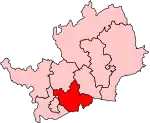| South Hertfordshire | |
|---|---|
| Former County constituency for the House of Commons | |
 South Hertfordshire in Hertfordshire, showing boundaries used from 1974-1983 | |
| County | Hertfordshire |
| 1974–1983 | |
| Seats | One |
| Created from | Barnet, Enfield West and St Albans |
| Replaced by | Hertsmere, Watford and St Albans[1] |
South Hertfordshire was a constituency in Hertfordshire which returned one Member of Parliament (MP) to the House of Commons of the Parliament of the United Kingdom. It was created for the February 1974 general election and abolished for the 1983 general election when it was mainly replaced by the new Hertsmere constituency.
Boundaries
- Statutory definition
- The Urban District of Potters Bar;
- the Rural District of Elstree;
- in the Rural District of St Albans the parishes of Colney Heath, London Colney, and St Stephen; and
- in the Rural District of Watford the parish of Aldenham.[2]
- Components' immediate predecessor seats
- The land of the Urban District of Potters Bar in local government administration-abolished Middlesex has been in Hertfordshire since the creation of Greater London in 1965. It now moved into this new seat from the abolished Enfield West seat.
- The Rural District of Elstree was in the abolished Barnet seat.
- The three St Albans district parishes came from the very long-lived St Albans seat and Aldenham came from South West Hertfordshire.
- Components' immediate successors
- Colney Heath went back to the St Albans seat and St Stephen transferred to the Watford seat.
- The rest formed most of the new constituency of Hertsmere.
Members of Parliament
| Election | Member | Party | |
|---|---|---|---|
| Feb 1974 | Cecil Parkinson | Conservative | |
| 1983 | constituency abolished: see Hertsmere | ||
Election results
| Party | Candidate | Votes | % | ±% | |
|---|---|---|---|---|---|
| Conservative | Cecil Parkinson | 21,190 | 40.3 | ||
| Labour | Alf Dubs | 18,104 | 34.4 | ||
| Liberal | John Henchley | 13,356 | 25.4 | ||
| Majority | 3,086 | 5.9 | |||
| Turnout | 52,650 | 82.2 | |||
| Conservative win (new seat) | |||||
| Party | Candidate | Votes | % | ±% | |
|---|---|---|---|---|---|
| Conservative | Cecil Parkinson | 21,018 | 42.7 | +2.4 | |
| Labour | Alf Dubs | 18,790 | 38.2 | +3.8 | |
| Liberal | John Henchley | 9,393 | 19.1 | −6.3 | |
| Majority | 2,228 | 4.5 | −1.4 | ||
| Turnout | 49,201 | 76.1 | −6.1 | ||
| Conservative hold | Swing | −0.7 | |||
| Party | Candidate | Votes | % | ±% | |
|---|---|---|---|---|---|
| Conservative | Cecil Parkinson | 27,857 | 54.1 | +11.4 | |
| Labour | NG Male | 16,059 | 31.2 | −7.0 | |
| Liberal | Gerald Sattin | 7,001 | 13.6 | −5.5 | |
| National Front | S Fenn | 605 | 1.2 | New | |
| Majority | 11,798 | 22.9 | +18.4 | ||
| Turnout | 51,522 | 79.0 | +2.9 | ||
| Conservative hold | Swing | +9.2 | |||
References
- ↑ "'Hertfordshire South', Feb 1974 - May 1983". ElectionWeb Project. Cognitive Computing Limited. Retrieved 22 March 2016.
- ↑ "The Parliamentary Constituencies (England) Order 1970". www.legislation.gov.uk. Retrieved 25 February 2019.
This article is issued from Wikipedia. The text is licensed under Creative Commons - Attribution - Sharealike. Additional terms may apply for the media files.